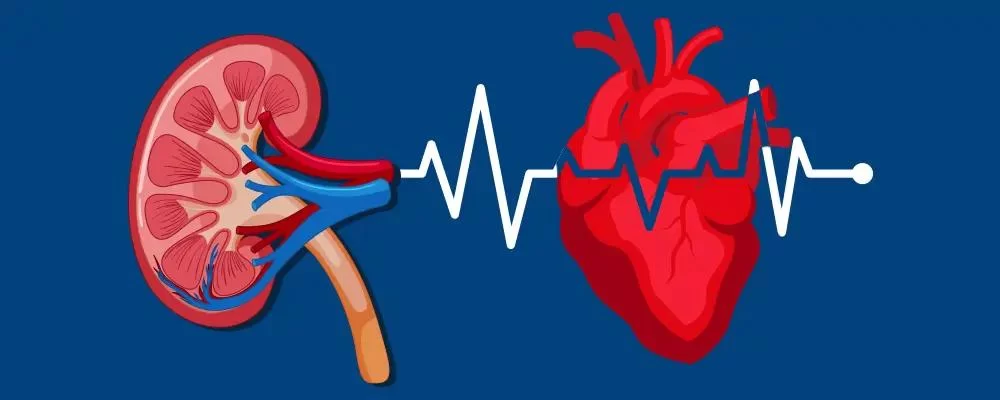Understanding the Link Between Kidney Disease and Heart Health
Did you know that your kidneys and heart are more closely related than you might think? It's not just a case of one organ working independently of the other; the health of one can significantly impact the health of the other. This connection is crucial when it comes to preventing heart disease, kidney disease, and other related conditions. In this article, we'll explore how kidney problems can affect your heart health and offer advice on managing both for a healthier future.

The Vicious Cycle: How Kidney Disease Affects the Heart
Chronic kidney disease (CKD) and heart disease often go hand in hand. One of the primary ways kidney disease affects heart health is through the buildup of waste products and fluid in the body. When the kidneys aren't functioning properly, toxins accumulate in the bloodstream, increasing the risk of high blood pressure, heart attacks, and heart failure. This results in a dangerous cycle where kidney disease worsens heart health, and poor heart health accelerates kidney damage.
Capital Health Medical Center – Hopewell
capital health medical center hopewell
1 Capital Way, Pennington, NJ 08534, USA

Impact on Blood Pressure
One of the most significant connections between kidney disease and heart health is the impact on blood pressure. Kidneys are responsible for regulating blood pressure by managing the balance of salt and water in the body. When kidney function declines, the ability to control blood pressure diminishes, leading to hypertension (high blood pressure), which is a major risk factor for both kidney failure and cardiovascular disease.
Fluid Retention and Heart Strain
As kidney function deteriorates, the body’s ability to remove excess fluid is compromised. This fluid retention can put additional strain on the heart. Over time, this can lead to heart failure, a condition where the heart becomes too weak to pump blood efficiently. Fluid buildup in the lungs, legs, and abdomen can lead to symptoms like shortness of breath, swelling, and fatigue, all of which indicate that both the kidneys and heart need immediate attention.
Heart Disease Can Also Harm Kidney Function
While kidney disease can damage the heart, the reverse is also true. Heart disease can impair kidney function. For example, in individuals with heart failure, blood flow to the kidneys may be reduced, leading to kidney damage. This creates a harmful feedback loop where both organs suffer, making it essential to manage heart health just as carefully as kidney health.
The Role of Atherosclerosis
Atherosclerosis, the hardening of the arteries due to plaque buildup, can affect both the heart and kidneys. When the arteries supplying blood to the heart or kidneys become narrowed or blocked, it reduces blood flow to these vital organs. Atherosclerosis not only contributes to heart disease but can also cause kidney problems, as the kidneys rely on a healthy blood supply to filter waste and excess fluid. Managing atherosclerosis can, therefore, help protect both your heart and kidneys.
How to Protect Your Heart and Kidneys
While the connection between kidney disease and heart health may seem overwhelming, there are several steps you can take to protect both organs and improve your overall health.
1. Control Your Blood Pressure
One of the most effective ways to protect your heart and kidneys is by managing your blood pressure. Regular monitoring and taking prescribed medications can help keep your blood pressure within a healthy range, reducing the risk of complications from both kidney and heart disease.
2. Eat a Heart-Healthy, Kidney-Friendly Diet
Diet plays a significant role in both kidney and heart health. A balanced diet rich in fruits, vegetables, lean proteins, and whole grains can help manage both blood pressure and cholesterol levels. Reducing salt intake is particularly important for people with kidney disease, as it helps reduce fluid retention and eases the strain on both the kidneys and heart.
3. Stay Active
Regular physical activity is essential for heart health and can also help manage kidney disease. Exercise helps maintain a healthy weight, lowers blood pressure, and improves circulation. Always consult your doctor before starting a new exercise routine, especially if you have kidney disease or heart conditions.
4. Monitor Your Cholesterol
High cholesterol is another factor that contributes to both heart disease and kidney damage. Keeping your cholesterol levels in check can reduce the risk of heart attacks, strokes, and kidney problems. Your doctor may recommend medication to manage your cholesterol if lifestyle changes aren't enough.
5. Manage Your Diabetes
If you have diabetes, managing your blood sugar levels is crucial. Uncontrolled diabetes can lead to kidney disease and increase your risk of heart disease. Keeping blood sugar within a healthy range can significantly reduce these risks.
Real-Life Story: A Journey Through Kidney and Heart Health
Take the story of Michael, a 58-year-old man from Ohio, who was diagnosed with both kidney disease and heart problems. For years, he struggled with high blood pressure, which eventually led to chronic kidney disease. Michael’s doctor explained that his kidney disease was affecting his heart, and vice versa. The good news is that with proper care—adjusting his medications, eating a healthier diet, and regular exercise—Michael was able to stabilize both his kidney and heart health. His story serves as a reminder that managing both conditions can make a difference in living a longer, healthier life.
Conclusion
The connection between kidney disease and heart health is undeniable. If one organ suffers, the other is likely to follow. By understanding this connection and taking proactive steps to manage your blood pressure, cholesterol, and overall health, you can improve both your kidney and heart function. Take control of your health today to protect both your kidneys and your heart for a better tomorrow.






















Deborah Heart and Lung Center
deborah heart and lung center
200 Trenton Rd, Browns Mills, NJ 08015, USA